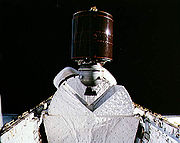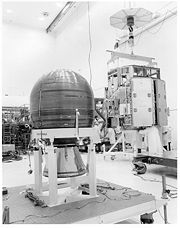
Payload Assist Module
Encyclopedia


Space Shuttle
The Space Shuttle was a manned orbital rocket and spacecraft system operated by NASA on 135 missions from 1981 to 2011. The system combined rocket launch, orbital spacecraft, and re-entry spaceplane with modular add-ons...
, Delta, and Titan launchers. The rocket was used to carry satellites from a low earth orbit to a geostationary transfer orbit or an interplanetary course. The payload was spin stabilized by being mounted on a rotating plate. Originally developed for the Space Shuttles, different versions of the PAM followed:
- PAM-A (Atlas class), development terminated
- PAM-D (Delta class), uses a Star-48B rocket motor
- PAM-D2 (Delta class), uses a Star-63 rocket motor
- PAM-S (Special) as a kick motor for the space probe UlyssesUlysses probeUlysses is a decommissioned robotic space probe that was designed to study the Sun as a joint venture of NASA and the European Space Agency . The spacecraft was originally named Odysseus, because of its lengthy and indirect trajectory to near Solar distance...
The PAM-D module, used as the third stage of a Delta II rocket, is the only version in use today.

GPS satellite
A GPS satellite is a satellite used by the NAVSTAR Global Positioning System . The first satellite in the system, Navstar 1, was launched February 22, 1978. The GPS satellite constellation is operated by the 50th Space Wing of the United States Air Force....
in 1993, crashed in the sparsely populated Saudi Arabian desert, where it was positively identified.
External links
- Payload Assist Module at the NASA Shuttle Reference Manual
- Payload Assist Module at GlobalSecurity.org

